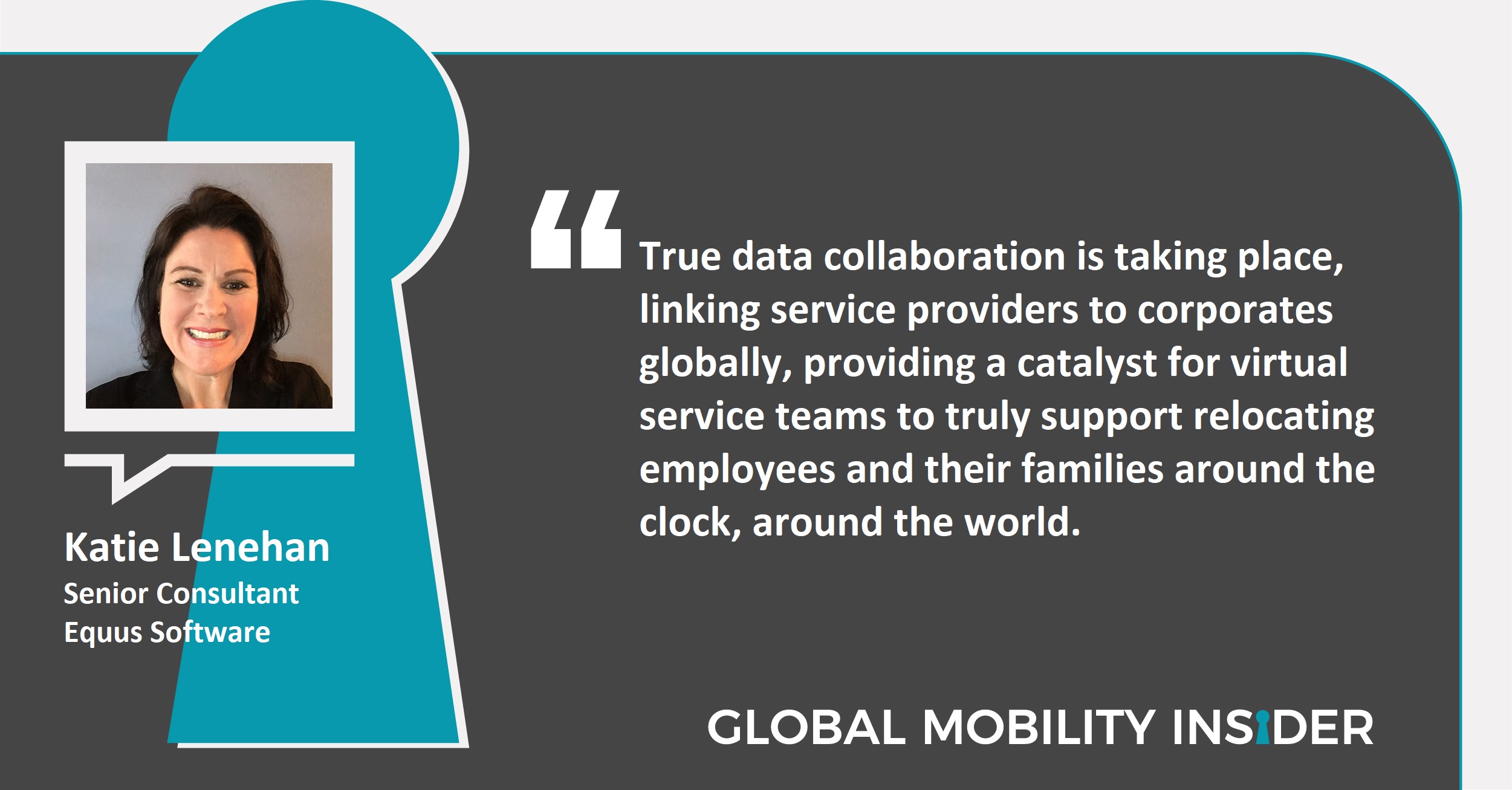Katie Lenehan - Senior Consultant - Equus Software

Professional Background
Senior Consultant, Equus Software (Unites States): 2018 – Present
Ineo Global Mobility, Senior Vice President Global Mobility (United States): 2015 – 2017
BGRS, Vice President, Client Financial Services (United States): 2005 – 2015
Prudential Relocation, Business Development Director (United States): 1994 – 2005
Career Insider
Q: Why global mobility, and how did you get started in the industry?
A: I started in mobility when I joined Prudential Relocation from a position at Sikorsky Aircraft. Once I got into the full-service delivery, I was intrigued by the numbers: federal acquisition regulation, gross-up, compensation allowances and tax to name a few. I learn something new daily, sometimes hourly! I stay because I love what I do. The industry is filled with dynamic, fun and smart people who have a passion for exemplary service. I consider myself fortunate to do something I truly believe in every day – helping people.
Click & Like on LinkedIn
Q: What advice would you give to someone looking to build a career in global mobility?
A: If you start in an area that doesn’t wow you, don’t give up! There is so much diversity in the Industry as a whole. Regardless of where you see yourself, make sure you love service. This is a service industry at every level, after all we are moving our corporate clients’ greatest asset, their people. I have been so privileged to have great leadership and key individuals that I consider mentors. I feel this has been a large contributor to where I am today and I do recommend, whenever possible, that you find someone you can bounce ideas around with and talk through events in the industry with.
Industry Insider
Q: How do you think the global mobility industry has changed over the years?
A: It’s grown considerably – not only in the sheer number of mobile employees, but also the complexity of the function. Global mobility professionals have moved from only doing transactional work, to being strategic advisors to the business. I believe technology has been instrumental in this evolution – thrusting us forward at an incredible pace. So, while the industry has grown, it seems to have gotten smaller and more connected at the same time. True data collaboration is taking place, linking service providers to corporates globally, providing a catalyst for virtual service teams to truly support relocating employees and their families around the clock, around the world.
Q: What do you think is the primary thing hindering the global mobility industry's progress?
A: In short, education. While I am not sure it’s necessarily ‘hindering’ global mobility’s progress, it’s certainly an area that organisations should not lose sight of as they seek to grow their talent pool. Often, when I ask most individuals how they got into mobility, it tends to be by ‘accident’ or ‘I fell into it’. At the same time, I am asked by my university age children’s friends, ‘What should I major in?’ ‘How do I get a job in that field once I’ve graduated?’ ‘What does the career path look like?’ I feel we do a nice job educating once in the industry, but for mobility to be a sought-after profession we need to get to folks before they’re in the industry. Students majoring in language, finance, business and hospitality services could greatly benefit from knowing that this extremely interesting and relevant industry exists.
Q: What is the most important strategic tip you can give to companies handling global mobility?
A: Ensure all key stakeholders are involved at some level. I realise you cannot have 27 cooks in a kitchen but you can have 27 employees working in a restaurant! The restaurant manager leverages the knowledge of the chef to create the menu and uses the knowledge and energy of the wait staff to prepare the dining room. Effective managers lead and solicit key stakeholders for their areas of expertise to bring together the ideal solution. Successful moves and assignments are a very big order; leverage your key stakeholders for their areas of expertise!
Visionary Insider
Q: How can global mobility practices get better in the next 5 years?
A:
- Continue to focus on the service experiences of our customers.
- Continue to invest in our people.
- Continue the growth and awareness around compliance. Proactive solutions are much better, and more cost-effective than reactive ones.
- Leverage technology. Not only to enhance the customer experience and drive towards compliance but to simplify the administrative burden for the general management team and customer alike.
Q: What more can be done to improve current global mobility practices to benefit talents on the move?
A: We have spent, and continue to spend, significant time and effort discussing return on investment (ROI) for moves, both global and point-to-point in country. I often wonder if we use the tracking, reporting and findings to the best of our abilities. For sure, the experts do policy analysis and make recommendations, and that is awesome, as I’m sure many corporate clients were able to produce savings. I want to see our industry experts push those data points forward; data analytics is all the talk, and it should be! We can leverage sourced data points with trending and analysis to make the best investments for the optimum ROI for enhanced experiences to transferees and expatriates as well as corporate clients. As a service provider, this feels like a win/win to me.
Either/Or…
- Short-term or long-term assignment? Short-term
- Airbnb or serviced apartments? Serviced apartments
- Excel or global mobility software? Global mobility software
- Lump-sum or flex-ben? Flex-ben
- Facebook or LinkedIn? LI
- Outlook or Gmail? Gmail
- Taxi or Uber? Uber
- iOS or Android? iOS
- Mac or PC? Mac (I prefer my PC but my 3 children advise otherwise)
- Computer or tablet? Computer
- Work hard or play hard? Work hard to play hard!


Leave a Comment
* Fields marked with this asterisk are mandatory.